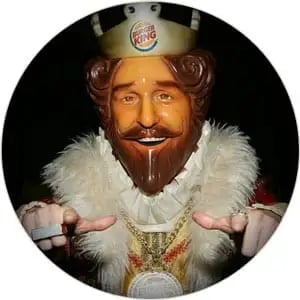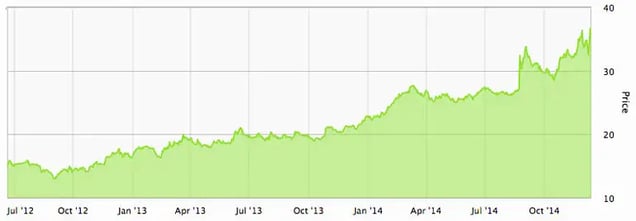In 2013, Burger King announced that Daniel Schwartz, a 32-year-old Cornell graduate, was going to take over as CEO, complete with an annual salary of $700,000 and potential cash bonus of $1.5m. He never worked in a restaurant, didn’t climb the corporate ladder, and had only been with the company for 3 years.

Seem crazy? The only crazy part is how much sense it makes. Here’s the backstory.
Making moves
Daniel Schwartz had a typical suburban upbringing. He grew up on Long Island and attended The Wheatley School where he played basketball and was an honors student.
After high school, Daniel shipped off 4 hours upstate to Cornell where he made the dean’s list and, in 2001, graduated with a degree in management and applied economics.
A couple stints at Credit Suisse and a hedge fund later, Daniel saw that the Brazilian-based investment firm, 3G Capital, was opening an office in New York and looking for recruits. It was 2005, Daniel had just turned 24, and he thought it seemed like a good fit. 3G Capital agreed and he got the job.
In case you aren’t familiar with 3G Capital, here are some of the bigger bullet points:
- They created a company called AmBev in 1999
- AmBev merged with the Belgian-based company Interbrew in 2004, creating InBev
- InBev bought Anheuser-Busch in 2008 for $52B (Bud Light)
- In 2010 3G Capital bought Burger King for $3.3B (Whoppers)
- In 2014 they bought the Canadian chain Tim Hortons for $12.5B, merged it with Burger King, and formed Restaurant Brands International (Coffee, donuts, burgers)
- In 2015 they partnered with Berkshire Hathaway to buy Kraft and merge it with Heinz, forming the Kraft Heinz Company worth about $46B (Cheese, ketchup, etc.)
Needless to say, they like big, old American staples and aren’t fucking around.

These cutbacks didn’t stop at the big-ticket items either. Apparently he required everyone to make long-distance calls on Skype to save on phone bills, send files via email instead of FedEx, and use communal printers to guilt people into saving paper.
That’s why in 2013, when the head honcho left to run Heinz (also owned by 3G Capital), it was an easy decision to promote Daniel as the 21st CEO of Burger King.
To put a 32 year-old CEO in perspective, the average age of CEOs in the S&P 500 is 57 (Zuck being the youngest at 30, Warren Buffett the oldest at 84).
Is this stuff legit?
Organizations like 3G Capital make their money through mergers and acquisitions– buying, selling, dividing, and combining companies to create value. It’s a chess match played with spreadsheets and a means of sparking growth through market dynamics and organizational efficiency, rather than relying solely on stuff like product, marketing, and sales.
In Monopoly terms, it’s like two players teaming up halfway through the game to create a monopoly instead of grinding it out until everyone gets bored. One has Ventnor, the other has Marvin Gardens and Atlantic, and combined they can start building houses.

For example, people got pretty peeved when Burger King merged with Tim Hortons in 2014 because, from an outside perspective, it looked like a clear case of tax inversion– when American companies relocate overseas to avoid paying U.S. taxes.
Maybe this was true, maybe not. Burger King claimed in a statement that the “transaction was driven by growth, not tax rates.” According to the watchdog group Americans for Tax Fairness, however, they’re projected to save as much as $820 million by 2018 from forgone capital gains taxes.
A changing of the guard
This type of drastic shift in mentality doesn’t happen every day for big corporations and, from my perspective, it’s strangely refreshing. Investors like 3G Capital look to make big changes quickly and, as a result, are willing to take risks on young enthusiasm over experience. Just look at their executive team: the CFO is 28 and the Head of Investor Relations is 29.
Now, instead of a bloated, slow-moving, behemoth the company updated its strategy, trimmed some fat, and invested in high-growth areas. It’s operating like a startup.
And so far the results are speaking for themselves. Between 2013 and December 2014, Burger King’s shares have gone up roughly 60% and their market cap doubled to over $9B. That means, considering the original price tag and extra profit, 3G Capital was essentially able to buy the company for nothing. Clearly, they’re happy with the new direction.

Even the franchise owners love the change and are happy with Schwartz calling him “extremely smart” and a “very fast learner.”
Needless to say, things are working out well so far for the young CEO. I guess it should’ve been expected though based on his senior quote from 1998:
“Some are born great, some achieve greatness, and some have greatness thrust upon them.”William Shakespeare, Twelfth Night
If you want to learn more about the Schwartz check out Bloomberg’s piece called “Burger King Is Run by Children.” It’s well written and has a cutesy illustration.
I’m gonna go get a Whopper.